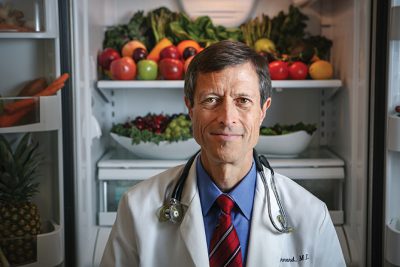“For reasons of compassion, health, or stewardship of the planet, taking the animals off the plate has more power than any other step.” – Neal Barnard, MD. Physicians Committee for Responsible Medicine
Most of us have long understood that fruits and veggies are good for us, and donuts and cheeseburgers—not so much. What many of us don’t know is exactly why some foods are bad for us and why others promote health.
Growing up, I was taught that candy and fast food was bad for me. Why? Because it would rot my teeth and cause me to gain weight. And that was what health boiled down to for me, and probably for many others. It was something I could gauge just by looking in the mirror, and something I needed to concern myself with only when it got difficult to fit into my jeans or to run up a flight of stairs.
As a child, pulling the fat off the bacon or eating an apple with my ‘Happy Meal’ meant I was being health conscious. Meat, cheese, and eggs gave me protein and calcium, and that was all good—or so I thought.
The hidden saturated fats, trans-fats, and high amounts of dietary cholesterol contained in meat, cheese, and eggs were completely unknown to me, and the fact that consuming these foods on a regular basis could increase my risk of serious conditions ranging from atherosclerotic plaque to cardiovascular disease was something I was yet to learn. And when we have too much cholesterol in our blood, it causes plaque to form along the walls of our arteries which limits blood flow to the heart, increasing risk of heart attack, peripheral artery disease, (PAD) and stroke.
Vegan Health
Doctors and medical dietitians are seeing the negative effects of too much saturated fat and bad cholesterol in their patients more and more frequently, because heart disease is currently the leading cause of death in the United States, and around the world, accounting for one in every four American deaths.
The good news is that, thanks to decades of research by leading cardiovascular physicians like Dean Ornish, MD (Preventative Medicine Research Institute) and Caldwell B. Esselstyn MD (Cleveland Clinic), there is now compelling scientific evidence that what we eat plays a central role in determining our risk of heart disease. As a result, medical professionals are finding that, often, the most powerful pill they can prescribe to their at-risk patients is not actually a pill at all. It’s plants!
Putting plant-based to the test
Researchers at New York University School of Medicine pitted vegan diets against the non-vegan diet recommended by the American Heart Association (AHA), which allows limited amounts of lean meat, eggs, and low-fat dairy along with an abundance of fruits and vegetables. Vegan diets, on the other hand, exclude all animal-based foods, including meat, fish, eggs, and dairy.
Over the course of the study, those observing a vegan diet saw a 20 percent drop in the concentrations of high sensitivity C-reactive protein (hsCRP), an important marker for chronic inflammation, compared to those on the AHA diet, indicating the superior health benefits that can be obtained through a whole foods plant-based diet. And there’s more!
Reversing Chronic Diseases with Plants
A diet that excludes eggs, meat, and dairy, and that is rich in plant-based foods can not only reduce your risk of life-threatening illnesses, but also reverse and even eliminate the symptoms of existing chronic diseases.
‘The Dr. Dean Ornish Program for Reversing Heart Disease’ is just one example of this. Currently, over 35 hospitals across the U.S. are using the Ornish Program – a whole foods plant-based lifestyle plan – to treat patients with life-threatening heart disease, and due to the overwhelming success of this program that number is growing.
In addition, a number of leading academic institutions – such as the Preventative Medicine Research Institute (PMRI) at the University of California and The Center for Nutritional Studies (CNS) at Cornell University – have conducted research studies showing that changes in diet and lifestyle can not only treat and reverse heart disease, but other chronic conditions as well.
Their studies have shown that plant-based diets, rich in fruits, vegetables, and whole grains, are protective against some types of cancers, Alzheimer’s disease, Crohn’s disease, depression, type-2 diabetes, kidney disease, sleep apnea, and even allergies. Doctors treating patients with type-1 diabetes have found that most can reduce the number of medicines they take on a plant-based diet as well.
Our genes are not our destiny
Many of us have diseases that run in our family. We are then inclined to believe that having a hereditary predisposition to a disease means that whatever we eat, it won’t make a difference, but we couldn’t be more wrong.
Considered to be the most comprehensive study in health and nutrition ever conducted, “The China Study” – which is the culmination of a 20-year medical research partnership between Cornell University, Oxford University, and the Chinese Academy of Preventative Medicine – shows that the high biological value of animal-based proteins (dairy, meat, and eggs) produces higher cancer growth rates, more abnormal growth factors, and more breast cancer. It also presents enough evidence to argue that casein, a protein found only in milk from mammals, is the most significant cancer-causing carcinogen we consume.
Decades of research by T. Colin Campbell, The Angiogenesis Foundation, and the PMRI also discovered that whilst animal proteins stimulate cancer genes, a whole foods plant-based diet can actually change gene expression in over 500 genes, “turn on” genes that protect against disease and “turn off” genes that promote breast cancer, prostate cancer, inflammation, and stress.
In short, we can control the activity of our genes by the foods we eat.
Plant-based for all
The American Academy of Nutrition & Dietetics states that:
“…vegan diets are healthful, nutritionally adequate, and may provide health benefits in the prevention and treatment of certain diseases. These diets are appropriate for all stages of the life cycle, including pregnancy, lactation, infancy, childhood, adolescence, older adulthood, and for athletes.”
This may be why a growing number of doctors, dietitians, and major healthcare providers are now more confident than ever about prescribing a 100 percent plant-based diet to their patients as an effective way to prevent, treat, and cure chronic diseases.
Hippocrates really was onto something profound when he declared: “Let food be thy medicine and medicine be thy food!”



